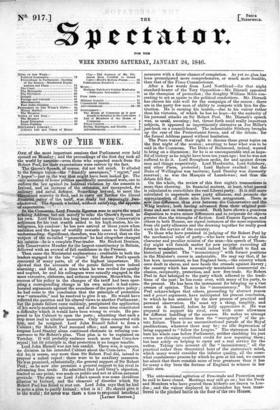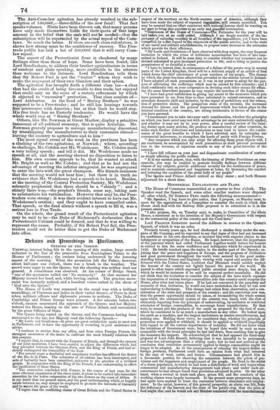The ante-sessional agitation of Free-trade and Protection may be said
to have closed. Meetings may still go on ; but the Peers and Members who have graced them hitherto are drawn to Lon- don ; and the valour displayed in skirmishes has been trans.- ferred to the pitched battle on the floor of the two Houses. The Anti-Corn-law agitation has already resulted in the sub- scription of 150,000/.,—three-fifths of the new fund I That fact speaks volumes. Hints have been thrown out that many persons have only made themselves liable for their quota of that large amount in the belief that the cash will not be needed—that the subscription will be superseded by the actual repeal of the Corn- laws. So much the better. If there are such close calculators, it shows how strong must be the confidence of success. The Free- trade public has laid a bet of 250,0001. that it will carry Corn- law repeal. The aspect of the Protectionist front is checkered by many feelings other than those of hope. Some have been found, like Lord Rendlesham, to address their brother agriculturists in terms of candour and plain speaking, more creditable to the utterers than welcome to the listeners. Lord Rendlesham tells them that Sir Robert Peel is not the " traitor " whom they wish to make the scapegoat of their own blunders and their spleen.
The agitation has brought forth a different class too—a class that had the credit of being favourable to free trade, but enjoyed that credit only on the score of a certain refinement by which it objected to "excessive" protection. That class consists of— Lord Ashburton. As the head of " Baring Brothers" he was -supposed to be a Free-trader ; and he still has leanings towards free intercourse with America ; but at that limit he would stop. His free trade has no Easterly tendencies. He would have the whole world stop at " Baring Brothers."
Others, like Mr. Newman at Great Marlow, display a primitive innocence of all political economy, that is quite Arcadian. Mr. Newman gravely proposes to assuage manufacturing discontent by transhipping the manufacturers to their customers abroad— leaving the country to agriculture and to him ! The most signal event of the week in the provinces has been a clashing of the two agitations, at Norwich ; where, according to challenge, Mr. Cobden met Mr. Wodehouse. Mr. Cobden made -a very telling speech ; and tell it did. Mr. Wodehouse made no speech at all, and the meeting showed no disposition to listen to him. His own excuse appears to be, that he wanted to attack Mr. Bright as well as Mr. Cobden ; and that as he had not the advantage of meeting the inferior attagonist, he was unprepared to enter the lists with the great champion. His friends insinuate that the meeting would not hear him ; but there is in truth no evidence that Mr. Wodehouse had a speech to be heard. Besides, at the meeting of the Central Protection Society, Mr. Wodehouse solemnly prophesied that there should be a " shindy " : and a shindy there was,—the prophet's friends, some say, taking care to substantiate his vaticmation. However that may be, the Free- traders were strong ; it was their evident interest to have out Mr. Wodehouse's oration,. and they ought to have compelled order. That speech, or the dead silence without a speech to fill it, was a serious loss to Free Trade.
On the whole, the grand result of the Protectionist agitation may be said to be—the Duke of Richmond's declaration that a Protectionist Cabinet could be formed, and that he was willing to represent the cause. Probably, if Sir Robert Peel fail, the Free- traders could not do better than to get the Duke of Richmond into office.



























 Previous page
Previous page